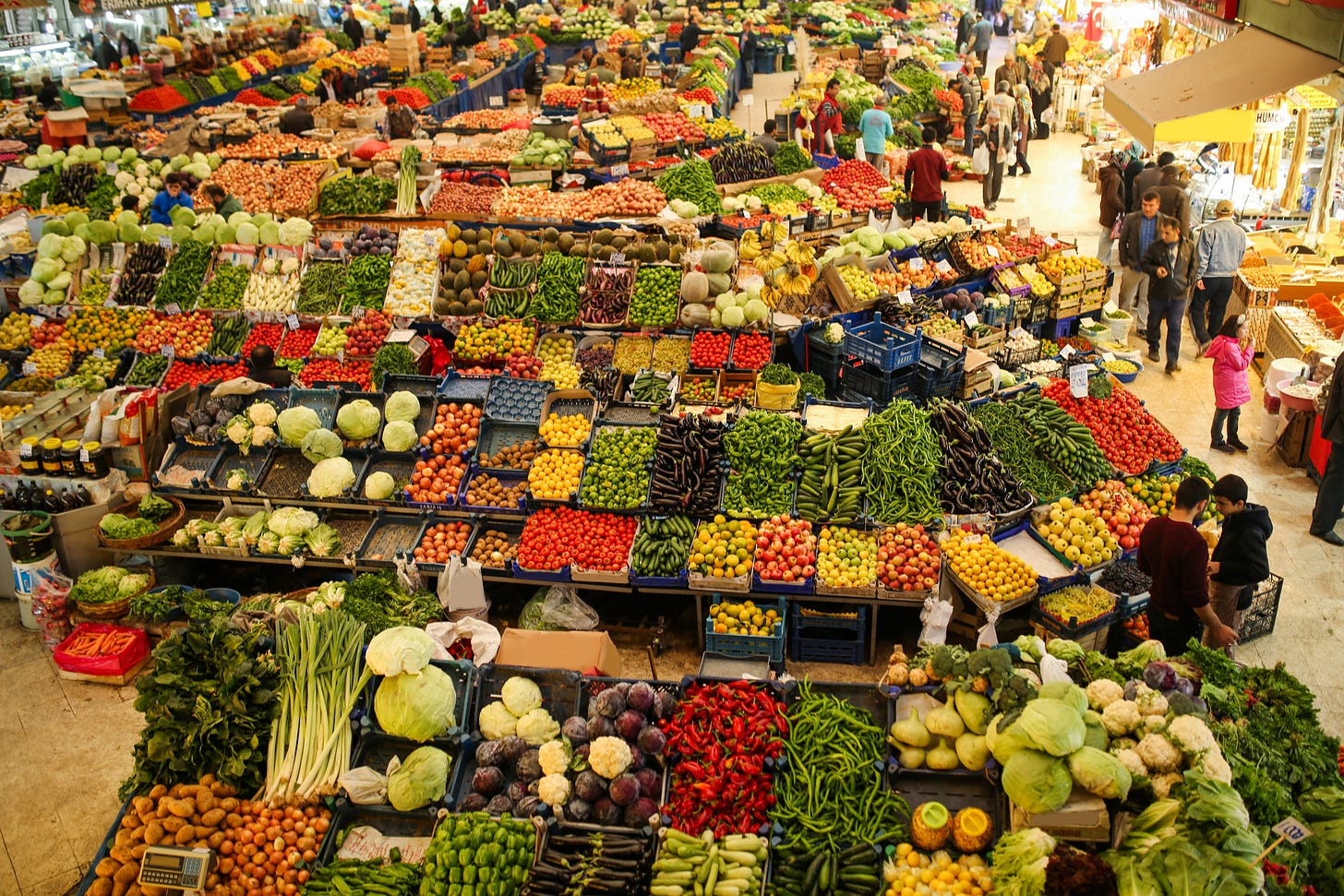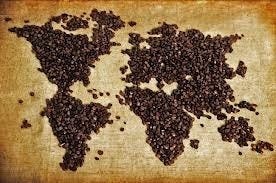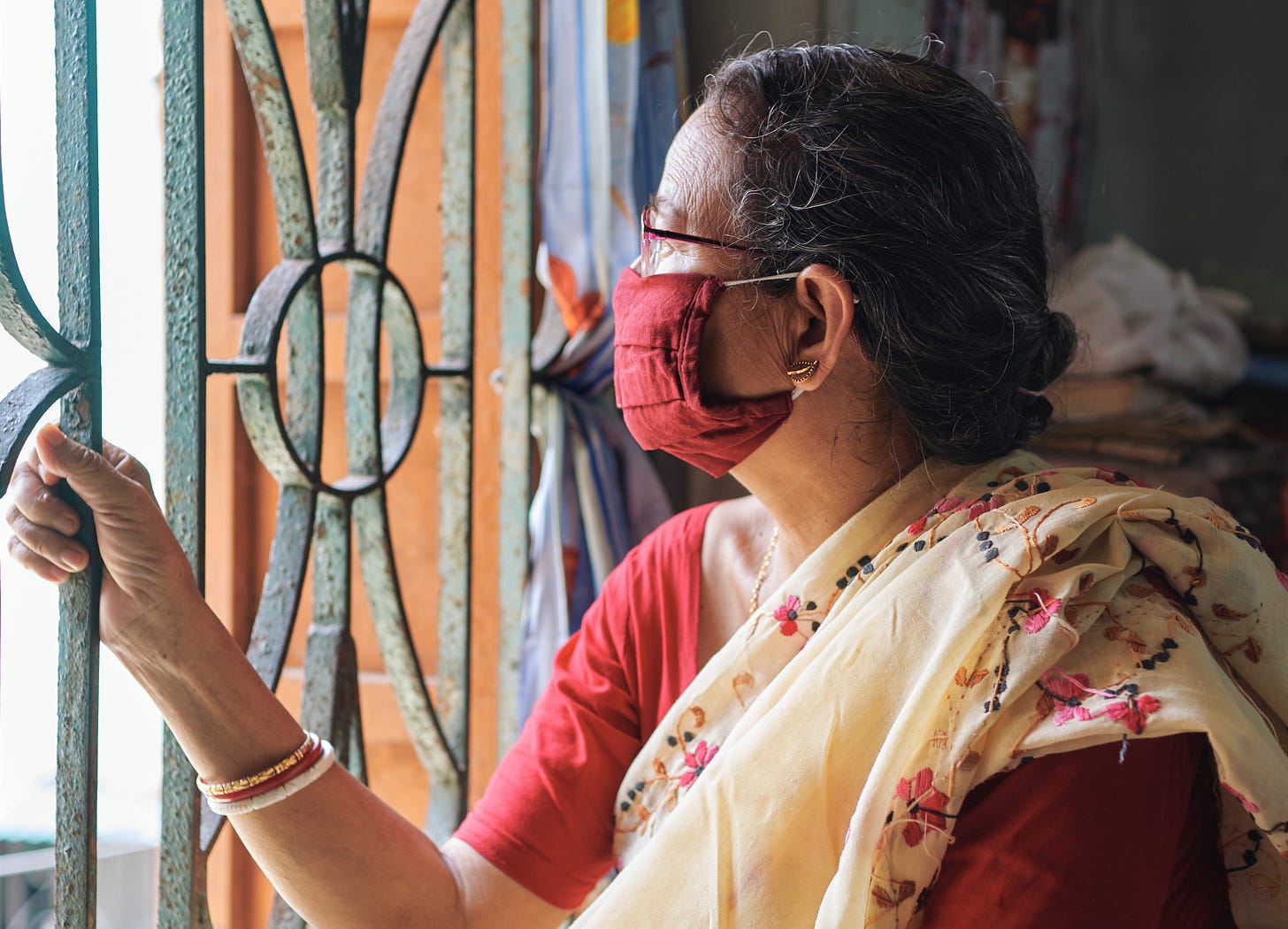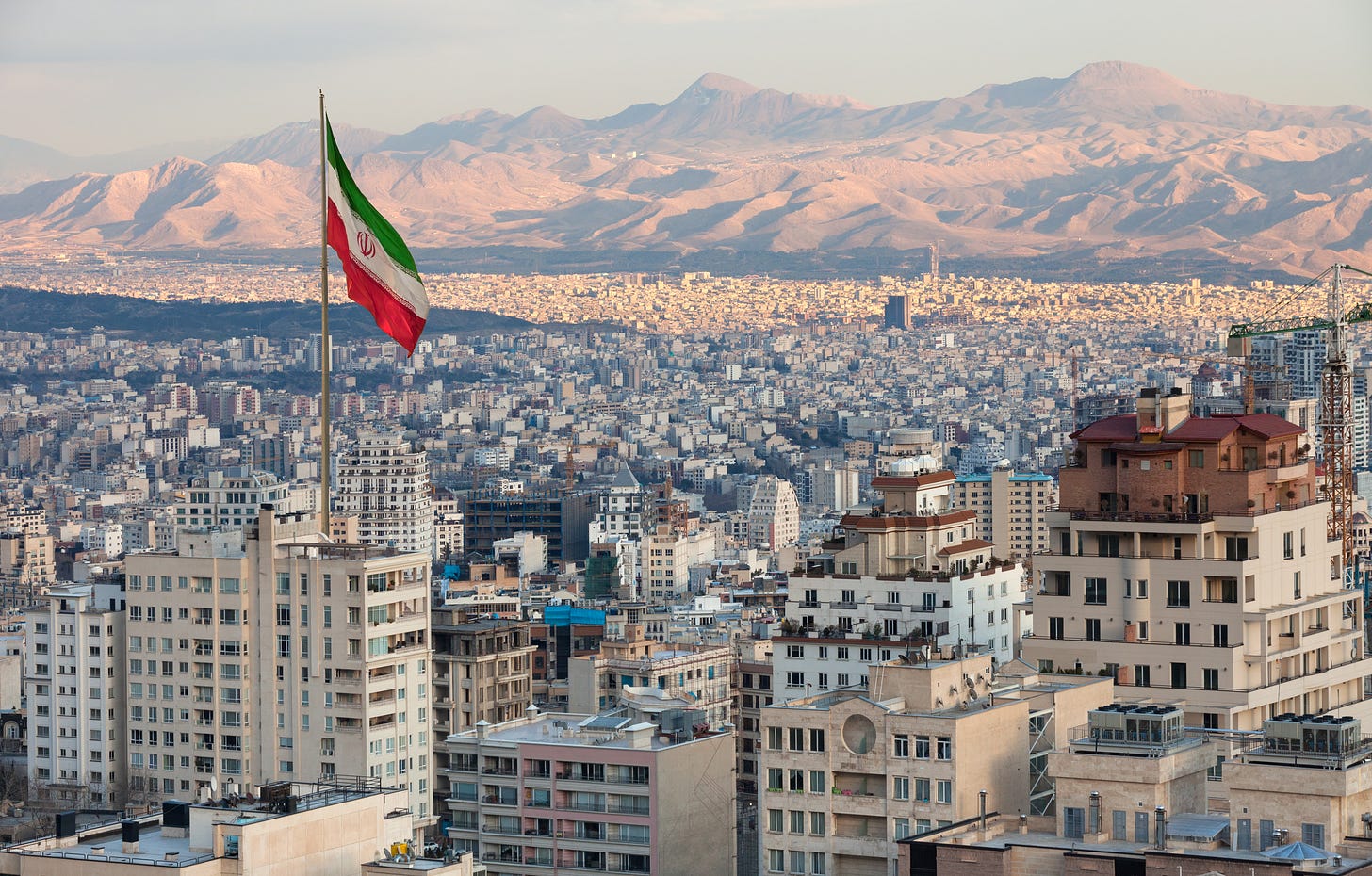Emerging Markets Daily - June 3
Global Food Prices Soar, India Covid Scars Hit Economy Hard, Vaccine Inequality Rising, Iran Nuke Deal Unlikely Until August, China/Apple Ties Grow, and Environmental Disaster Looms in Sri Lanka
The Top 5 Emerging Markets Stories from Global Media - June 3
Konya, Turkey Food Market (Credit: Ugur Durmas)
Inflation Stalking: Global Food Prices Soar to Highest in a Decade
Financial Times
“Global food prices surged by the biggest margin in a decade in May as one closely-watched index jumped 40 per cent in the latest sign of rising food inflation.”
“The year-on-year leap in UN Food and Agriculture Organization’s monthly food price index was the largest since 2011 and signalled that inflation initially stoked by pandemic disruption is accelerating.”
“China’s soaring appetite for grain and soyabeans is adding to upward pressure on prices, along with a severe drought in Brazil and growing demand for vegetable oil for biodiesel.”
“The index is a key benchmark for internationally traded agricultural commodities and the increase brings it to its highest level since September 2011. The rise in world market prices will further increase food price inflation especially among poorer countries reliant on imports for staples.”
“In 2020, the world’s consumer price inflation for food jumped to 6.3 per cent, up from 4.6 per cent in 2019, according to the FAO. The pandemic disrupted food supply chains, affecting the production and distribution of food, with South Asia, sub-Saharan Africa and Latin America among the most affected regions.”
“The bad weather in Brazil, a big exporter of corn and soyabeans, and rising demand for soyabean oil for biodiesel have pushed prices higher, said analysts.” Emiko Terazono reports.
For more on rising food and commodity prices, and why your morning coffee price is set to rise further, see the recent Emerging World column - Globalization in a Mug.
India’s Covid Scars Cut Deep, Revising Growth Forecasts Downward
Reuters
“Expectations for India’s economic growth are being revised sharply lower as a surge in people losing their jobs and defaulting on debt suggest a more halting recovery from the financial shock of the COVID-19 pandemic.”
“Economists are downgrading their estimates as a range of data – from the rate of cheques bouncing to the amount of mortgaged gold jewellery up for sale - shows the extent of the economic damage from a devastating second wave of the disease.”
“Some observers also fear the psychological blow from the virus disaster that ripped through India this year killing tens of thousands of people will leave consumers reluctant to spend.”
“India’s government is sticking with a forecast that the economy will grow 10.5% in the fiscal year that started on April 1, but on Tuesday State Bank of India - the country's largest lender - slashed its growth forecast to 7.9% from 10.4%. Several international banks such as Barclays and UBS have also cut back their predictions.”
“After a 7.3% contraction in 2020-21 - the sharpest ever recorded by India - the relatively muted recovery puts India at odds with countries like United States and China that are seeing a swift rebound as they emerge from the pandemic, and suggests deeper damage has been done to an economy worth around $2.9 trillion before the crisis hit.”
“The knock-on effects of sub-par growth on a rapidly developing economy like India could be significant.” Reuters reports.
Developed Countries Lock Up Covid-19 Vaccines Through 2023
The Wall Street Journal
“The European Union, Canada and other developed countries have signed deals to get hundreds of millions of doses of Covid-19 vaccines and boosters over the next two years, furthering a divide between rich and poor countries.”
“Under the recent deals, Pfizer Inc. and BioNTech agreed to supply the European Union up to 1.8 billion doses of their vaccine through 2023, while agreeing to supply Canada up to 125 million doses.”
“Australia, Switzerland and Israel, meanwhile, are set to get Moderna Inc.’s shot through next year, and Switzerland has options for doses in 2023.”
“The agreements will ensure the countries, including some that failed to lock up sufficient supplies of the mRNA vaccines earlier this year, have enough supplies to inoculate residents and protect them against potentially elusive variants, while providing a sales windfall to the manufacturers.”
“Yet the deals once again leave out developing countries, many of which have fallen behind in vaccinating residents and struggled to contain the spread of the virus.” Jared S. Hopkins reports
Geopolitics: Iran Nuclear Deal Unlikely Until At Least August
bne IntelliNews
“Negotiators now expect to finalise a deal to revive the 2015 nuclear deal in August when Iranian President Hassan Rouhani’s term of office concludes, according to Ali Rabiei, spokesman for Iran’s government.”
“Hopes that an agreement acceptable to Tehran and the US could be found ahead of Iran’s June 18 presidential election appear to be fading. If such a deadline was met, it might prove a vote winner for the candidates in the poll who are closer in their politics to the pragmatic, moderate Rouhani.”
“Thus the hardliners close to the supreme leader, Ayatollah Ali Khamenei—who has the final say on all matters of state and who on May 27 approved the Guardian Council election vetting body’s move to exclude the top moderate candidates from the upcoming contest—would likely prefer any relaunch of the nuclear deal to be announced once the voting is over.”
“Rabiei said that there were ‘no obstacles’ in the way of negotiators in Vienna, who have completed their eighth week of talks, adding at a televised press conference: ‘We’re close to an understanding over principal, nuclear issues… [but there are] some differences such as [ex US president Donald] Trump’s sanctions and Iran’s measures need to be worked out. It is natural that due to the complexities created by the Trump administration's numerous sanctions and Iran's measures..., many details need to be considered, but none of these obstacles are insurmountable,’ Rabiei added.”
“The delegations from Iran, the US, France, Germany, the UK, China and Russia were on June 2 gearing up to return to their capitals by the end of this week to consult with their governments on sticking points. There were tentative suggestions that they might reconvene in Vienna on June 10.” bne IntelliNews reports.
China Ousts Taiwan as Apple's Biggest Source of Suppliers
Nikkei Asia
“China now boasts more Apple suppliers than any other country, a sign that Washington's attempt to untangle U.S. and Chinese supply chains has had little impact on the world's most valuable tech company.”
“Of Apple's top 200 suppliers in 2020, 51 were based in China, including Hong Kong, according to a Nikkei Asia analysis of the Apple Supplier List released last week, up from 42 in 2018 and knocking Taiwan out of the top spot for the first time. Apple did not release data for 2019.”
“Chinese suppliers have also helped Apple build production capacity in other Asian countries as part of the company's strategy to diversify its supply chain.” Cheng Ting-Fang and Lauly Li report
What We’re Also Reading….
Huawei Launches HarmonyOS for Smartphones to Challenge Android
South China Morning Post
“Huawei Technologies Co will this week launch HarmonyOS 2.0, the updated version of its in-house developed mobile operating system, as the Chinese telecommunications giant accelerates its move away from Google’s Android platform amid its struggles with US trade restrictions.”
“Shenzhen-based Huawei, the world’s largest telecoms equipment maker and formerly China’s biggest smartphone vendor, will introduce HarmonyOS 2.0 on June 2 across a number of devices, including handsets, tablets and smartwatches. It also aimed to get other smartphone vendors to use the platform.”
“It remains to be seen whether HarmonyOS will be quickly embraced by consumers and app developers in the world’s largest smartphone market and in major overseas markets.” Che Pan reports
Israel Opposition Parties Agree to Form New Unity Government
BBC
“Israeli opposition parties have reached an agreement to form a new government that would end Benjamin Netanyahu's 12-year tenure as prime minister.”
“Yair Lapid, leader of the centrist Yesh Atid party, announced an eight-faction coalition had been formed.”
“Under a rotation arrangement, the head of the right-wing Yamina party, Naftali Bennett, would serve as prime minister first before handing over to Mr Lapid.” BBC News reports
Sri Lanka braces for environmental disaster as ship sinks
AP
“Authorities in Sri Lanka were trying to head off a potential environmental disaster Thursday as a fire-damaged container ship that had been carrying chemicals was sinking off of the country’s main port.”
“The Singapore-flagged MV X-Press Pearl started sinking Wednesday, a day after authorities extinguished fire that raged on the vessel for 12 days. Efforts to tow the ship into deeper waters away from the port in Colombo failed after the ship’s stern became submerged and rested on the seabed.”
“The ship’s operators X-Press Feeders have said the fire destroyed most of the ship’s cargo, which included 25 tons of nitric acid and other chemicals. But there are fears that remaining chemicals as well as hundreds of tons of oil from the vessel’s fuel tanks could leak into the sea if it sinks.”
“Such a disaster could devastate marine life and further pollute the island nation’s famed beaches. The disaster has already caused debris — including several tons of plastic pellets used to make plastic bags — to wash a ashore.” Bharatha Mallawarachi reports





